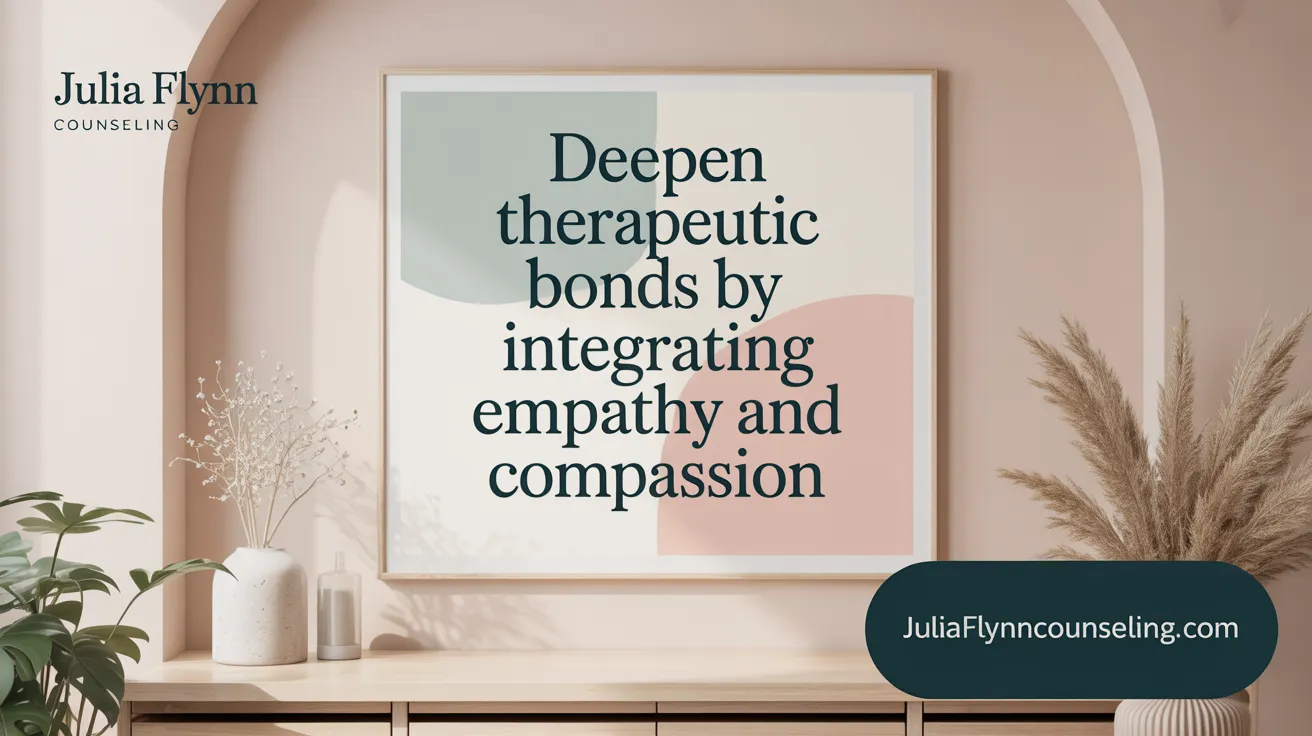Setting the Stage for Compassion and Authenticity in Therapy
In the evolving landscape of mental health care, two cornerstone qualities—compassion and authenticity—are increasingly recognized as essential for effective therapeutic practice. By intertwining genuine human connection with a deep commitment to empathy and self-awareness, mental health professionals can foster environments that promote healing, resilience, and growth. This article explores how combining compassion and authenticity not only strengthens therapeutic relationships but also enhances mental well-being for both clients and therapists alike.
Understanding Authenticity: The Foundation of Genuine Therapeutic Connection

What is authenticity and how is it defined in mental health practice?
Authenticity in mental health refers to being true to oneself by aligning one's internal values, beliefs, emotions, and thoughts with outward behaviors and communication. It encompasses self-awareness, unbiased processing of information, acting in a manner consistent with personal values, and maintaining genuine relational connections. This alignment fosters honesty and congruence both within the self and in interactions with others (Authenticity and brain health, Authenticity, Authentic communication in helping professions, Julia Flynn Counseling).
What are the components of authenticity?
Authenticity consists of several interrelated components:
- Self-awareness: Recognizing and understanding one's own feelings and values.
- Unbiased processing: Open and non-defensive evaluation of information, including self-reflective honesty.
- Behavioral congruence: Acting in ways that are consistent with one’s beliefs and values.
- Relational orientation: Engaging in sincere and transparent relationships.
Together, these elements contribute to living and relating authentically (Authenticity and brain health, Cultivating Authenticity in Therapy, Authenticity in Therapy).
What neurobiological factors are associated with authenticity?
Studies have identified brain correlates linked to authenticity, such as increased surface area in the left precuneus—a region involved in self-referential processing—and smaller volumes in the left amygdala, which relates to emotional regulation. Neural circuits supporting self-awareness include the somatosensory cortex, insula, and the default mode network. The ventromedial prefrontal cortex underpins reflection and emotional processing critical to authentic experience (Authenticity and brain health, Authenticity and brain health).
What psychological benefits does authenticity provide?
Living authentically is strongly associated with positive mental health outcomes. It promotes:
- Increased psychological well-being: Greater life satisfaction and emotional vitality.
- Enhanced resilience: Ability to cope effectively with stress and adversity.
- Improved self-esteem and purpose: A stronger sense of self-worth and life meaning.
- Better relationships: Authentic people tend to form deeper, more supportive social connections.
Conversely, inauthenticity correlates with increased psychological distress, anxiety, depression, and low self-esteem (Authenticity and brain health, Authenticity as a Predictor of Mental Health, Authenticity and mental health, Power of Authenticity in Mental Health, Lighthouse Counseling Ltd.).
How does authenticity influence mental health outcomes?
Research confirms that authenticity significantly predicts mental health status. Higher levels of authentic living correlate with reduced psychological distress and enhanced overall well-being. Individuals who live authentically experience personal growth, develop meaningful relationships, and show greater emotional regulation. Integrating authenticity within therapeutic contexts supports healing by fostering genuine self-expression and congruent interactions essential for mental health recovery (Authenticity and mental health, Power of Authenticity in Mental Health, Cultivating Authenticity in Therapy, Power of Authenticity as a Therapist, Embracing Authenticity).
The Vital Role of Compassion in Mental Health Care

How is compassion defined and what distinguishes it from empathy?
Compassion is defined as an authentic concern for the suffering of others, coupled with a strong motivation to alleviate that suffering. Unlike empathy, which involves sharing or feeling what another person experiences emotionally, compassion is characterized by a proactive desire to help. Neuroscience research shows that compassion activates brain regions involved in caregiving and reward, such as the inferior frontal gyrus and basal ganglia, which differs from empathy's association with areas like the anterior insula. For a detailed exploration, see Art of Compassion in Mental Healthcare and Role of Compassion in Mental Health.
What are the mental health benefits of compassion?
Compassion plays a crucial role in improving mental health treatment outcomes. It enhances client satisfaction, boosts treatment adherence, and leads to better overall clinical results. Importantly, compassion helps reduce symptoms of anxiety, depression, and perceived stress. For mental health therapists, practicing self-compassion reduces burnout, promotes emotional resilience, and supports sustained therapeutic effectiveness. Learn more about Role of Compassion in Therapy and Self-compassion in Therapists.
Compassion-Focused Therapy and Neuroscience
Compassion-Focused Therapy (CFT) is an evidence-based approach designed to cultivate compassion toward oneself and others. It specifically targets issues like self-criticism and emotional regulation difficulties. Neuroscientific studies underscore compassion’s ability to engage the brain's caregiving and reward systems, releasing oxytocin and lowering stress hormones like cortisol, which fosters improved mood and emotional well-being. For more information on the neuroscience and applications, see Compassion-Focused Therapy (CFT) neurobiological basis and Compassion Cultivation Training Program at Stanford.
Benefits for Both Clients and Therapists
Clients experience a therapeutic environment built on compassionate presence, engagement, and active skills such as validation and listening, which fosters trust and security. Therapists trained in compassionate care report enhanced well-being and professional satisfaction. This dual benefit creates a positive feedback loop that strengthens therapeutic relationships and clinical outcomes. See insights on Self-compassion in therapists and Therapeutic Communication in Nursing.
Integrating Self-Compassion for Therapist Well-being and Clinical Effectiveness
What is Self-Compassion and Its Core Components?
Self-compassion involves treating yourself with kindness and understanding during times of difficulty or perceived failure. It consists of three main components: self-kindness (being gentle with oneself), mindfulness (maintaining awareness of one's feelings without judgment), and recognizing common humanity (understanding suffering as a shared human experience). For more details, see Self-compassion in therapists.
Why is Self-Compassion Important for Mental Health Professionals?
Mental health therapists often face high stress and emotional demands. Self-compassion reduces burnout, compassion fatigue, and secondary traumatic stress. It enhances emotional regulation, self-awareness, and the ability to maintain therapeutic balance, which in turn improves clinical effectiveness. For an in-depth discussion refer to Benefits of self-compassion and Mental health practitioner self-care.
How Can Therapists Cultivate Self-Compassion?
Effective methods include structured interventions such as the Mindful Self-Compassion program and Loving-Kindness Meditation. These approaches increase mindfulness and kindness toward oneself.
How Does Self-Compassion Relate to Burnout Reduction?
Research shows self-compassion acts as a mediator for how mindfulness training can reduce therapist burnout. Therapists who practice self-compassion are better able to cope with occupational stress and maintain resilience. See self-compassion as a mediator for burnout reduction and Mental health practitioner self-care.
What Practical Techniques Support Developing Self-Compassion?
Daily practices like morning intention setting, the RAIN technique (Recognize, Allow, Investigate, Nurture), positive affirmations, strength spotting, and community connection are beneficial. These help foster mindful awareness and kindness toward oneself, creating sustainable self-care routines for therapists. For practical guidance, consult Building a Compassion Practice for Mental Health and Practicing Self-Compassion.
These combined self-compassion approaches encourage therapists to nurture their emotional well-being, resulting in enhanced therapeutic presence and better care for their clients. Additional evidence and insights can be found at Self-compassion and therapeutic effectiveness.
Authenticity in Therapists: Showing Up Fully for Clients
How does therapist authenticity influence the therapeutic process?
Therapist authenticity, characterized by genuine emotional presence and vulnerability, plays a pivotal role in the therapeutic process. When therapists show up authentically, clients experience a safe and trusting environment that encourages openness and honesty. This atmosphere fosters deeper client engagement, making therapy more effective by promoting bravery and facilitation of meaningful change. Authentic therapists share their true selves, including their emotional responses, which helps build a stronger connection and supports clients in feeling truly understood and valued. The Power of Authenticity as a Therapist highlights how therapist emotional presence and vulnerability in client outcomes deepen therapeutic connection and healing.
What therapist qualities support authentic practice?
Key qualities enabling therapists to practice authentically include:
- Self-awareness: Being mindful of one's internal states and maintaining congruence between internal experiences and outward expressions.
- Integrity: Upholding honesty and ethical consistency throughout the therapeutic relationship.
- Flexibility: Adapting to the unique needs and circumstances of each client without rigid adherence to protocol.
- Affective Competence: Managing and appropriately expressing emotions within the therapeutic context.
- Intentionality: Engaging purposefully with clients, creating intentional therapeutic moments.
These qualities together support the integration of authenticity and compassion, enhancing the therapist’s presence and effectiveness. For a deeper understanding, see Authenticity and Empathy - Lighthouse Counseling Ltd. and Authenticity for Therapists - Keystone Therapy Group.
Impact of authentic therapeutic presence on client healing
An authentic therapeutic presence deepens relational trust, which is essential for clients to feel safe sharing vulnerabilities. This trust cultivates emotional regulation, self-awareness, and resilience in clients. The genuine connection also aids in breaking down barriers to healing, fostering client empowerment and therapeutic momentum toward growth and recovery. Research on Authenticity and mental health supports the role of authenticity in promoting psychological well-being and resilience. Additionally, fostering such authenticity in therapy aligns with principles discussed in Cultivating Authenticity in Therapy - Growing Together Counseling.
Empathy’s Complementary Role in Compassionate and Authentic Care

What is empathy and what are its dimensions?
Empathy is the ability to understand and share the feelings of another, going beyond mere sympathy. It involves three main dimensions:
- Emotional empathy: Feeling what another person feels.
- Cognitive empathy: Understanding the perspective and thoughts of others.
- Behavioral empathy: Acting in ways that demonstrate care and support.
This multifaceted nature supports deep connection and effective communication in mental health settings. For more on this, see Role of empathy in health care and What Is Empathy?.
How is empathy used in health and mental health care?
In mental health practice, empathy is foundational for building trusting relationships. It helps clients feel heard and safe, validating their experiences and fostering openness. Through empathic engagement, therapists can tailor interventions thoughtfully and encourage client motivation.
Empathy contributes to better clinical outcomes, increased treatment adherence, and lower practitioner burnout. It enhances therapeutic presence and supports compassionate care, bridging genuine concern and professional effectiveness. Learn more from The Role of Empathy in Mental Health Care and Empathy in counseling.
What techniques help develop and maintain empathy?
Developing empathy requires intentional practices such as:
- Active listening with reflective feedback and nonverbal cues.
- Mindfulness to stay present and nonjudgmental.
- Cultural competence to appreciate clients’ unique backgrounds.
- Role-playing exercises to practice perspective-taking.
- Supervisory support and self-reflection to understand biases and emotions.
- Setting professional boundaries to prevent emotional exhaustion.
These strategies enable mental health professionals to sustain empathic engagement over time. For detailed approaches, see Techniques to develop empathy and Empathy training and self-care.
What are the benefits and challenges of empathy in mental health care?
Benefits:
- Enhances therapeutic alliance and client satisfaction.
- Reduces stigma and isolation.
- Promotes emotional healing and resilience.
Challenges:
- Risk of empathy fatigue or burnout from emotional overload.
- Institutional barriers like time constraints or high caseloads.
- Balancing empathy with professional objectivity and boundaries.
Continued education and organizational support are essential to overcome these challenges. More information can be found at Therapist well-being strategies and Challenges to empathy in health care.
How does empathy differ from compassion and sympathy?
Empathy involves sharing and understanding another’s feelings; compassion builds on empathy by including a genuine desire to alleviate suffering through helpful action. Sympathy, by contrast, is feeling pity or sorrow without the shared emotional experience.
In mental health, compassion incorporates empathy but moves further to motivate supportive interventions. Authentic care integrates empathy's understanding with compassion’s active kindness, fostering healing relationships. For deeper insights, visit The Relationship Between Compassion and Mental Health and Compassionate Nursing Care.
Authentic Communication: Enhancing Trust and Connection in Therapy

Why is authentic communication essential in mental health practice?
Authentic communication is pivotal in mental health care because it builds transparency and trust between therapist and client. When clients perceive genuine communication, they feel safe and empowered to express their true feelings and thoughts freely. This openness deepens the therapeutic relationship, fostering engagement that ultimately supports improved emotional and psychological well-being. For more on the importance of authentic communication in therapy, see Authentic communication in helping professions and Effective communication benefits.
What communication styles benefit mental health?
Effective communication styles significantly affect mental health outcomes. Assertive communication—characterized by clear, direct, and respectful exchanges—encourages confidence, helps manage stress, and nurtures healthy relationships. In contrast, passive communication can lead to anxiety and low self-esteem, aggressive styles may increase stress and trauma, and passive-aggressive patterns may erode trust and contribute to burnout. Learn about Four Primary Communication Styles and strategies for Improving Communication with Mental Health Professionals.
Verbal and nonverbal communication cues
Both verbal and nonverbal signals are crucial in therapy. While words convey explicit messages, nonverbal cues such as body language, facial expressions, and tone of voice often communicate more than speech alone. Approximately 93% of communication is nonverbal, and therapists skilled in observing and interpreting these cues can better understand and respond to clients’ unspoken needs. See Characteristics of Effective Communication for detailed insights.
Assertive communication techniques
Assertiveness involves expressing one’s thoughts and feelings honestly while respecting others. Techniques include using "I" statements to convey personal experience, active listening to validate the speaker, maintaining good eye contact, and setting clear boundaries. Developing these skills encourages mutual respect and reduces misunderstandings, supporting mental health. Explore Assertive Communication Techniques and Effective Communication Benefits.
Therapy’s role in improving communication skills
Mental health therapy provides a supportive space for clients to develop authentic communication. Therapists guide clients in recognizing unhealthy communication patterns and practice assertiveness through role-playing, feedback, and skill-building exercises. This process not only improves personal relationships but also enhances overall mental well-being by fostering self-expression and connection. For more on therapy’s role in communication, see Therapy approaches for primary care providers and Cultivating Authenticity in Therapy.
| Aspect | Description | Impact on Mental Health |
|---|---|---|
| Authentic Communication | Genuine, transparent interaction | Builds trust and deeper client engagement (Authentic communication in helping professions) |
| Communication Styles | Assertive vs. passive/aggressive/passive-aggressive | Assertive promotes confidence; others may harm (Communication Styles Overview) |
| Nonverbal Cues | Body language, tone, facial expressions | Enhances understanding and emotional attunement (Characteristics of Effective Communication) |
| Assertive Techniques | "I" statements, active listening, boundary-setting | Encourages respect and reduces conflict (Assertive Communication Techniques |
| Therapeutic Support | Skill-building in therapy | Improves self-expression and interpersonal connection (Cultivating Authenticity in Therapy) |
Addressing Challenges: Navigating Pseudo Vulnerability and Therapist Self-Care
What is pseudo vulnerability and why is it important to recognize in therapy?
Pseudo vulnerability refers to inauthentic expressions of distress that appear as vague complaints, sympathy-seeking, or victimhood without genuine emotional connection. These behaviors, such as the Complaining Protector or Attention Seeking modes, can create therapeutic impasses by fostering dependency and preventing true emotional processing. Recognizing pseudo vulnerability enables therapists to avoid reinforcing maladaptive coping and instead guide clients toward authentic vulnerability, which is critical for effective healing. For further reading on this topic, see pseudo vulnerability and emotional authenticity in therapy.
How can therapists distinguish authenticity from pseudo vulnerability?
Authentic vulnerability involves genuine emotional openness and clear relational goals, whereas pseudo vulnerability is marked by manipulative or vague emotional displays seeking rescue or validation. Therapists assess emotional tone, attachment quality, and communication goals to differentiate between these modes, thereby ensuring that empathy is extended appropriately without enabling unhealthy patterns. Learn more about authenticity and empathy in therapeutic relationships and about balancing care and frustration in therapy.
What strategies help manage therapeutic impasses due to pseudo vulnerability?
Therapists utilize empathic confrontation, clear limit setting, and encouraging genuine emotional engagement to navigate pseudo vulnerability. Balancing compassionate care with appropriate frustration fosters client resilience and authentic emotional expression. These strategies prevent therapy stagnation and promote healthier relational patterns. Detailed strategies are discussed in managing pseudo vulnerability in therapy.
Why is self-care important for therapists maintaining compassionate, authentic care?
Mental health professionals face high risks of burnout, emotional exhaustion, and professional impairment due to the demands of compassionate care. Engaging in self-care practices—such as mindfulness, maintaining life balance, seeking social support, and supervision—is an ethical obligation that sustains therapists’ well-being. Self-awareness and regular reflection enable therapists to manage stress effectively, maintain presence, and provide authentic support to clients. Comprehensive discussions on this are available in mental health practitioner self-care to prevent burnout and self-compassion as mediator for burnout reduction.
What ethical responsibilities do therapists have regarding self-care?
Professional codes of ethics underscore the duty of mental health practitioners to care for their own well-being. Upholding this responsibility safeguards clients by ensuring therapists remain emotionally available, resilient, and competent. Ethical self-care practices also include respecting personal limits and seeking assistance when needed, thereby preserving the quality and integrity of therapeutic relationships. See the professional standards of care for mental health practice for more on ethics and therapist responsibilities.
| Challenge | Description | Therapeutic Strategy | Therapist Self-Care Practice |
|---|---|---|---|
| Pseudo Vulnerability | Inauthentic distress hindering therapy progress | Empathic confrontation, limit-setting | Mindfulness, supervision, reflection |
| Burnout and Emotional Exhaustion | Risk from sustained compassionate work | Balanced caseloads, professional support | Social support, self-awareness |
Maintaining a balance between compassionate empathy and professional boundaries, alongside dedicated self-care, empowers therapists to support genuine healing while sustaining their own mental health. For further resources on the role of compassion in mental health care and cultivating self-compassion for therapists, see the linked materials.
Cultural Competence and Inclusivity in Compassionate Authentic Care

How do culture and systemic factors influence compassion and authenticity in therapy?
Cultural values deeply shape how compassion and authenticity are expressed and perceived in mental health care. Individualistic societies often prioritize self-compassion, while collectivist cultures emphasize compassion toward others. Therapists practicing compassionate, authentic care must integrate cultural competence in affirmative mental health practice by honoring diverse identities and experiences. Addressing systemic oppression—including racism, sexism, homophobia, transphobia, and ableism—is critical to dismantling barriers that hinder trust and healing (Building a Compassion Practice for Mental Health).
What are effective practices for promoting inclusivity and cultural sensitivity?
Effective compassionate care involves trauma-informed, client-centered, and affirmative therapy approaches that validate individual identities and strengths. Recognizing social determinants of mental health such as poverty and social isolation enhances understanding of client challenges (Art of Compassion in Mental Healthcare). Implementing culturally sensitive communication and fostering environments that respect clients’ backgrounds promote authenticity and connection (Cultivating Authenticity in Therapy.
Community-Based Compassionate Initiatives
Community programs like the "Atmiyata" initiative in India exemplify compassionate solidarity by linking mental health support with social inclusion. Such initiatives improve outcomes by addressing both individual and systemic needs within culturally congruent frameworks.
Therapists committed to inclusive, compassionate, and authentic care create safer, equitable spaces that empower clients and acknowledge the complexities of culture and oppression in mental health (AMHCA practice guidelines).
Evidence-Based Practices Supporting Compassionate and Authentic Therapy
How do evidence-based practices integrate compassion and authenticity?
Empirically supported treatments (ESTs) such as Compassion-Focused Therapy (CFT), Cognitive Behavioral Therapy (CBT), and Emotion-Focused Therapy effectively weave compassion, empathy, and authentic therapeutic engagement into their models. These approaches emphasize genuine human connection, mindful self-compassion training for therapists, and emotional authenticity, creating a safe space for clients to explore their difficulties and foster healing.
For example, CFT explicitly targets self-criticism and promotes kindness toward oneself, which aligns with fostering authenticity and self-awareness (Compassion-Focused Therapy (CFT) neurobiological basis. CBT encourages clients to identify and challenge limiting beliefs about themselves, facilitating authentic self-expression. Therapists demonstrate authentic presence and empathy, enhancing trust and therapeutic alliance (Authenticity and Empathy, Power of Authenticity as a Therapist).
Why is ongoing professional development important for compassionate, authentic care?
Continued education and supervision are vital to maintaining high ethical standards and preventing therapist burnout (Mental health practitioner self-care). Training in empathy development and culturally competent communication helps professionals stay attuned to clients’ diverse needs and experiences (Role of empathy in health care, Communication Styles Overview, Cultural competence in affirmative mental health practice. Regular self-reflection ensures therapists remain congruent with their values and sustain the genuine presence essential for effective care.
Professional guidelines emphasize the ethical obligation of self-care and the importance of integrating neuroscience findings and evidence-based techniques that support compassion and authenticity (AMHCA practice guidelines, Professional standards of care in mental health). This ensures that mental health providers deliver interventions that are both scientifically sound and deeply humanistic.
The role of evidence-based communication and empathy training
Effective communication skills, inclusive of empathetic listening and validating clients’ emotions, are foundational components intertwined with evidence-based therapy models (Therapeutic Communication in Nursing, Empathy and Mental Health Literacy study). Programs and trainings enhancing these abilities contribute to stronger therapeutic relationships, better treatment adherence, and improved outcomes (Empathy in counseling).
Benefits of the combined approach to mental health outcomes
Integrating compassion and authenticity through evidence-based methods leads to reduced symptoms of distress, increased resilience, and enhanced well-being (Self-Compassion and Mental Health, Power of Authenticity in Mental Health). Clients experience deeper connections, improved self-esteem, and greater satisfaction with therapy, ultimately promoting sustained mental health improvements.
This holistic blend of empirical rigor and heartfelt practice underscores the evolving landscape of mental health care, prioritizing both effectiveness and genuine relational connection (Art of Compassion in Mental Healthcare, compassion and mental health).
Embracing Compassion and Authenticity for Transformative Mental Health Care
Combining compassion and authenticity represents a transformative paradigm in mental health practice. By fostering genuine presence, empathetic understanding, and self-compassion, therapists create safe spaces where clients can heal and thrive. Authentic communication and cultural sensitivity further enhance therapeutic connections, ensuring inclusive and effective care. As mental health professionals prioritize their self-care and continual growth, they not only prevent burnout but also embody the very compassion and genuineness they seek to cultivate in their clients. Embracing this integrated approach advances mental health treatment, enriches relationships, and empowers individuals on their journey toward well-being and authentic living.
